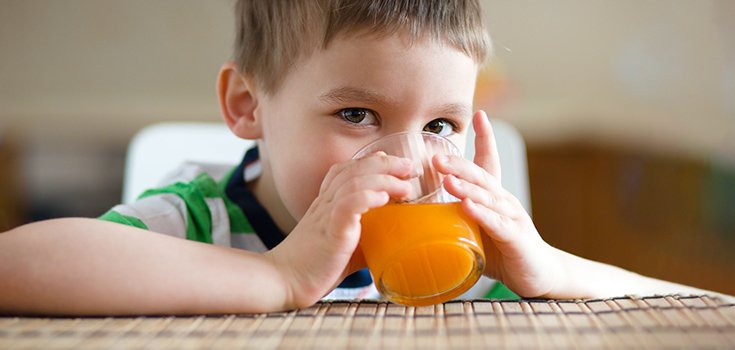100% Fruit Juice: A Healthy Drink for Kids, or Liquid Candy?

A study published in the journal Pediatrics suggests that drinking one serving a day of 100% fruit juice is linked to a slight weight gain in children age 6 or younger, but no weight gain in children age 7 or older. [1]

Health experts and nutritionists have been concerned that the content of naturally-occurring sugars in fruit juices can cause obesity and other health problems in youngsters.
In order to make 8 ounces of orange juice, for example, 4 to 5 medium oranges are needed; and each orange contains about 9 grams of sugar. The American Heart Association says that children and teens should consume no more than 8 ounces of sugary beverages a week. [1] [4]
Read: “Healthful” Fruit Juice May Have More Sugar than Soda
Dr. Brandon Auerbach, a primary care physician and instructor at the University of Washington’s Division of General Internal Medicine in Seattle, says:
“I think caution is definitely in order and that when possible, parents should give whole fruit to kids, instead of fruit juice.
I share the concern that 100% fruit juices have a lot of sugar, even though it’s naturally occurring sugar. There are other health concerns about drinking 100% fruit juice, besides weight gain, especially related to risk of cavities and risk of future metabolic syndrome or diabetes.” [1]
The Study

The study was a systemic review and meta-analysis of 8 previous observational studies on 100% fruit juice consumption and weight gain among children, based on their body mass indexes (BMIs).
Among children ages 1 to 6, consumption of one daily serving of 100% fruit juice was associated with 0.3 pounds of weight gain or less over on year. In kids age 7 and older, the juice consumption was not associated with any weight gain.
Dr. Dean Schillinger, a professor of medicine at the University of California, San Francisco, who was not involved in the study, says:
“While the amount of annual weight gain may be small … two points should be made.”
He explains:
“For a 5-year-old, 40-pound girl, consuming 4 to 8 ounces of 100% fruit juice daily for a year will be associated with her gaining an extra quarter-pound, compared to if she had not been drinking that juice.”
Schillinger adds that:
“the effect of daily consumption appears to be amplified the longer a young child is exposed to daily fruit juice. Consuming fruit juice daily for two years was associated with a significantly greater amount of weight gain.”
To put it in simpler terms, the study does not show that gaining a quarter-pound due to fruit juice consumption over 2 years causes a half-pound weight gain. Rather, it suggests that there is a risk of much greater weight gain with prolonged fruit juice consumption.
Says Schillinger:
“This study determined that the individual effect on obesity was ‘clinically small.’ However, they acknowledge that, from a population health standpoint, such small changes may, in fact, have important public health implications with respect to the obesity and diabetes epidemics. The evolving consensus is that children should not be exposed to fruit juices, especially in the first 6 years of life.”
Additionally, the researchers write, even though weight gain in children ages 2 to 6 was not clinically significant, individual studies in the analysis pointed to clinically significant weight gain in children under age 2.
The Value of Whole Fruit

Ironically, some of the same foods that can prevent diseases like type 2 diabetes can also cause them if consumed in juice form. Take blueberries, grapes, and apples, for example. Eating these fruits lowers your risk of diabetes; but greater consumption of fruit juice, in general, is associated with a greater likelihood of developing the disease, according to Harvard University researchers.
Read: WHOLE Foods Harness Amazing Protective Properties
Whole fruit contains fiber, phytonutrients like antioxidant-rich carotenoids, anti-inflammatory flavonoids, and vitamins and other nutrients that you simply can’t get in a glass of juice because it doesn’t include the skin or pulp. [5]
Many store-bought fruit juices have added sugars such as high-fructose corn syrup, so juicing at home is better.
Sources:
[1] CNN
[2] Reference
[3] Spark People
[4] American Heart Association
[5] The Daily Meal
